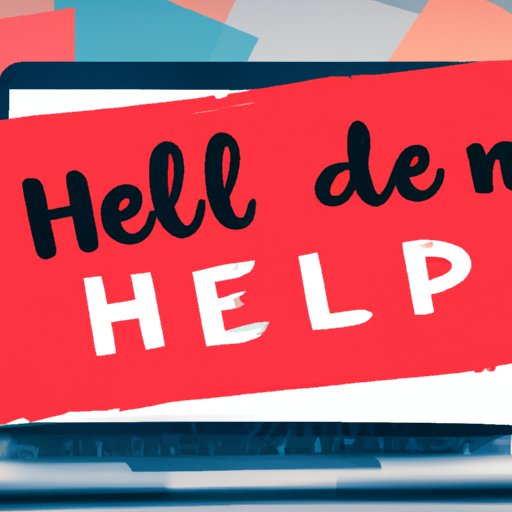
Can I Help You?
As human beings, we are wired for connection and community. We thrive when we feel a sense of belonging and purpose. However, sometimes we face challenges and obstacles that we can’t overcome on our own. In these moments, we may need to ask for help or offer help to others. Asking for help can be difficult, especially if we feel vulnerable or afraid of being judged. Likewise, offering help can also be challenging, as we may not know how to approach someone in need or fear being rejected.
In this article, we’ll explore the concept of asking for help and offering help to others. We’ll discuss how it relates to personal and professional success and the psychological and societal benefits of seeking and offering help. We’ll also provide practical tips on how to be a helpful person and how to overcome common barriers that prevent people from asking for help. Finally, we’ll discuss the importance of self-care as a foundation for helping others effectively.
“Can I Help You?” A Simple Question with a Deep Meaning
The question, “Can I help you?” may seem simple, but it carries a deep meaning. When we ask someone if we can help them, we’re signaling that we care about them and want to support them in their time of need. On the other hand, when we offer help to someone, we’re also showing empathy and compassion. By offering our time, resources, and skills, we’re strengthening our bond with others and making the world a better place.
Research shows that asking for help and offering help to others can have both psychological and societal benefits. According to a study conducted by the University of Michigan, when people help others, they experience a “helper’s high,” a rush of endorphins that can boost mood and reduce stress. When we offer help to others, we also strengthen our social network and feel a sense of belonging.
The Benefits of Asking for Help
Asking for help is not a sign of weakness. In fact, it can be an effective way to learn and develop new skills. When we ask someone to teach us something, we’re demonstrating humility and a willingness to grow. We’re also opening ourselves up to new perspectives and ways of thinking.
Asking for help can also lead to a stronger sense of community and belonging. When we ask for help, we’re giving others the opportunity to show their kindness and compassion. We’re also building reciprocal relationships, where we can offer help to others in the future.
How to be a Helpful Person
If you want to be a helpful person, there are many practical ways to offer assistance to those in need. One great way to help others is to volunteer. Volunteering not only benefits the people you’re serving, but it can also provide a sense of purpose and fulfillment. You can volunteer at local non-profits or charities, or you could sign up for a service-oriented trip like a mission trip or alternative spring break.
You can also be a helpful person in your daily life by practicing empathy and active listening. When someone is talking to you about their problems, try to listen without judgment or interruption. Ask questions to show you’re engaged in their story, and offer validation and support. Giving people space to talk openly and honestly can be a significant way to help them process their emotions and find solutions to their problems.
Dealing with Reluctant Help-Seekers
For some people, asking for help can be a daunting task. They may feel like they’re burdening others with their problems or fear being judged. If you’re trying to help a reluctant help-seeker, there are several things you can do to offer support. Firstly, you can acknowledge their feelings and validate their experience. Let them know that it’s okay to struggle sometimes, and that asking for help is a sign of strength.
Another good strategy is to normalize help-seeking behavior. Sharing stories about times when you’ve asked for help and how it benefited you can help others see that asking for help is a natural part of the human experience. Lastly, you can be persistent without being pushy. Continue to offer your support, but also give them space to make their own decisions.
Can We Really Help Others Without Helping Ourselves First?
While it’s important to help others, we can’t do so effectively if we’re not taking care of ourselves first. Self-care is crucial for our physical, emotional, and spiritual wellbeing. When we prioritize self-care, we’re better equipped to deal with stress and challenges. We’re also better able to offer help to others, as we’re not operating from a place of depletion or burnout.
If you’re looking to prioritize self-care, there are many things you can do. Firstly, ensure you’re getting enough sleep, exercise, and healthy food. These things are foundational to our overall health and wellbeing. You can also practice mindfulness and meditation, which can help you to stay grounded and present in the moment.
Another important aspect of self-care is pursuing your interests and hobbies. When we engage in activities that bring us joy, we’re more likely to be positive and fulfilled. Finally, remember to ask for help when you need it. Self-care isn’t just about taking care of yourself, but also recognizing when you need support from others.
Conclusion
Asking for help and offering help to others is a vital aspect of personal and professional success. It can lead to psychological and societal benefits, such as increased sense of belonging and community. If you’re looking to be a helpful person, there are many practical ways to offer assistance, including volunteering and active listening. If you’re dealing with a reluctant help-seeker, try to normalize help-seeking behavior and be persistent without being pushy. Finally, remember that self-care is a foundation for helping others effectively. By taking care of ourselves, we’re better equipped to show empathy and compassion to those in need.




